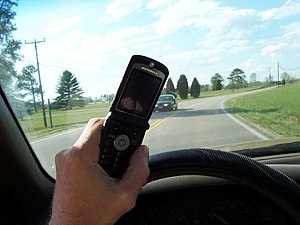 Image via Wikipedia
Image via Wikipedia
I will take the next few paragraphs and present information from both sides that will hopefully educate on making informed and educated decisions when you get behind the wheel of your vehicle.
First, let's take a look at the states that currently have some sort of law in place. (Note: I live and work in Kentucky and as of this moment there isn't a law in place, but legislators are expected to pass something this session. The Governor of Kentucky did issue an executive order that all state employees are not to send/receive emails or text messages while operating state owned vehicles.) Here is a website that gives an excellent description of what each state currently enforces: http://www.ghsa.org/html/stateinfo/laws/cellphone_laws.html
Next, let's look at the statistics involved with distracted driving. In 2008, there were nearly 6,000 people killed and over a half million injured where at least one driver was using a cell phone or texting/emailing. Driver distraction was involved in 16% of all fatal crashes in 2008 and was most prevalent among drivers 20 years old and younger. (Reading Eagle Press, Reading PA) Drivers that use cell phones are four times as likely to get into crashes serious enough to injure themselves (NHTSA, National Institute for Highway Safety) and driving while using a cell phone reduces the amount of brain activity associated with driving by 37 percent. (Carnegie Mellon)
So if all the data points to distracted driving being more dangerous than driving while impaired (drugs and/or alcohol) and most states have some law in place or are researching putting one in place - why do we continue to use our devices while we are behind the wheel? To me, the answer is simple. We depend more and more on these devices with each passing day. We are more connected to others and the rest of the world than we have ever been. We thrive on communication, up-to-date information and real-time media. So regardless of our location (home, office, vehicle, etc.) we have that desire to communicate, share, read, etc. 24/7.
This past week I came across a new application called DriveSafe.ly. The app (available for Blackberry, Win Mobile and eventually iPhones) is supposedly able to read your text messages and email messages back to you - hands-free. (Here is the website: http://www.drivesafe.ly) My first thought is - "great - what a novel idea!" But wait - won't I still have to somehow look at my phone and launch the app? I'm not quite sure how this app, or future applications that attempt the same, will fair for consumers. Honestly, if they are not able to not only read my messages to me, but then allow me to respond hands-free, then I can't see the value. It is difficult for me to provide a full evaluation of this product, since it isn't available for iPhone users yet, but if you want to read what Blackberry users have to say about the app - visit this site here.
My hope is that you make an educated decision when you get behind the wheel of a vehicle and use safety and caution prior to operating your mobile device. I know more than anyone the need to be connected 24/7, but is it worth your life to update your Facebook, tweet your location or check the score of your favorite team? Not to this guy.
JDS | CIO




No comments:
Post a Comment